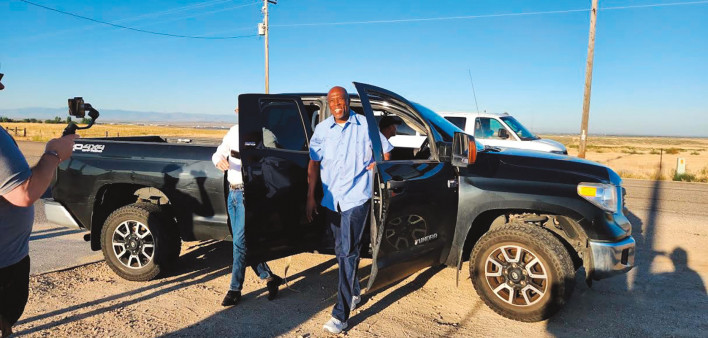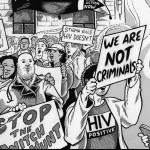When Kerry Thomas began serving a 30-year sentence in Idaho for nondisclosure of his HIV-positive status in 2008, becoming a prominent voice for people living with the virus was the furthest thing from his mind. But that changed when a few years into his sentence, he was notified that someone wanted to meet with him to discuss the injustice of his prosecution.
Thomas wasn’t interested at first. He was just trying to serve his time and not make waves. As he was walking to the visitors’ room for the meeting, he told the officer accompanying him, “I’m just doing this to be polite. Give me about 15 minutes, and get me out of here.”
The person waiting for Thomas was Sean Strub, founder of POZ and the Sero Project. Strub and Thomas ended up speaking for eight hours. By the time they were done, Thomas knew he had to become involved with the Sero Project. “I didn’t want the next person, in Idaho or otherwise, to go through what I went through,” Thomas says. “Anything I could do to help with that—I was on board.”
What followed was years of Thomas granting media interviews from prison and appearing at conferences via video chat. In September 2023, he was released after 15 years of incarceration, due, at least in part, to his involvement with the Sero Project and its fierce advocacy on his behalf.
Thomas spoke with POZ contributing writer Mark S. King about his new role as the community HIV decriminalization strategist at the Sero Project.

Kerry Thomas on the cover of Turn It Up!, a magazine for incarcerated peopleCourtesy of the Sero Project
I’ve been watching you in interviews for years. The difference is that I have always heard you speaking from the confines of the Idaho State Penitentiary. Now you work with the Sero Project, which works to modernize or reform HIV criminalization laws, and you are Exhibit A. Can you tell us what happened 15 years ago?
In 2008, I was charged and convicted of “failure to disclose” my HIV status to my [sexual] partner. I decided to take a plea, and the judge sentenced me to 30 years.
You had sex with a woman with whom you used a condom, and you were undetectable at the time—so you had two modes of prevention—and there was no HIV transmission.
Like with many nondisclosure statutes [across the country], they don’t require transmission, and it’s more like you have to prove that you did disclose. It’s a brutal process.
You decided to cop a plea. Tell me why you made that choice.
My son was just turning 14 at the time. These kinds of charges encounter a lot of media attention. It was heavy. It was numbing. I felt fearful and alone.
I also had two parents who were elderly. The media attention had absolutely nothing to do with the virus or the medical facts.
Considering these laws are often a stand-in for homophobia and racism, you became the big, bad Black boogeyman. So rather than face a jury, you decided to go the route of pleading.
It wasn’t necessarily to get out of the drama publicly. I would argue that people who are HIV positive just want to tell the truth.
It wasn’t as if people in my work environment didn’t know about my status, but it comes down to the people who need to know. It’s not a requirement that people who are positive have to put their business out there 24/7.

Thomas in an HIV criminalization awareness campaign by the Sero ProjectCourtesy of the Sero Project
I have often said that my personal medical information is none of anyone’s business. Especially if I pose no threat to you.
Yes.
One might expect that you counted on some humanity from the judge, at least a sentence that did not amount to 30 years. That must have been a shock to you.
When you’re sentenced, they tell you why they are sentencing you to this time. What [the judge] said was, “I can’t trust you to be in society.” That really hit me. That’s a bold statement.
The profound ignorance of people who have our lives dangling on a string is quite often astounding. And yet by the time that you were speaking from prison regularly at the HIV Is Not a Crime conferences, you had come to a place of acceptance and service to other people. That’s truly remarkable.
I appreciate that. I don’t disregard my accuser. [HIV criminalization] puts a strain on everyone, including the person who’s making the accusation. There’s no opportunity to have that give and take, to give honest medical information to the person. That’s left out. They’re left to believe all the negative things—that I’m a pariah, that anyone who is HIV positive is reckless, the phobias and the racism.
And what I learned is that the victim in this case just wanted an explanation. She wanted to know why someone she trusted in an intimate way would put her “at risk.”
And her ignorance is understandable. She was afraid. Fear is a powerful thing. But once the cops are involved, there’s no going back. It’s too late.
Something I will always be grateful for is that I had to file what is known in Idaho as a commutation. It goes to the parole commission, and the parole commission is the one that decides if they are going to modify my sentence. As part of that, my accuser wrote a letter [to the parole commission] saying, “I understand, and I’ll leave the decision up to you.”
You decided to be of service during your time in prison.
I didn’t know what being an activist meant, but I knew that I wanted to be involved. The Idaho Department of Correction was equally a partner with me and Sero. They allowed me to speak at conferences.
The value for me was that it gave me the space to figure this thing out, to decide that I do want to be an advocate.
I realized I do want to speak up for trans people in prison or 18-year-olds who go there and aren’t sure how to survive. I was able to develop, because of the Department of Correction, relationships with a lot of people that way. It’s who I know now that brings value to my life and has brought freedom back into my life.
One thing we have in common beyond HIV is that we were in a situation where we felt that all was lost, and we figured out a way to turn it outward toward others—which to me is the little secret to life. You take what’s going on with you and you use it to help somebody else.
Isn’t that the truth? The joy I get in the world is not mine anyway. It is not something that I own or possess.
It’s a gift. You get more by giving it away. You don’t hold on to it. And my fear that I had during my initial HIV diagnosis was that I better hold on to whatever I thought that my self-worth was at the time.
As it turns out, all the corny things they say are true, in terms of giving and receiving. And either of us would have reason to be resentful or a little jaded at this point, taken what we have been through.
Holding on to resentment, that’s just chain-smoking hate. And I just can’t do that anymore. You’ve got to just let that stuff go.
Mark S. King is the author of My Fabulous Disease: Chronicles of a Gay Survivor and a GLAAD Award–winning writer







1 Comment
1 Comment